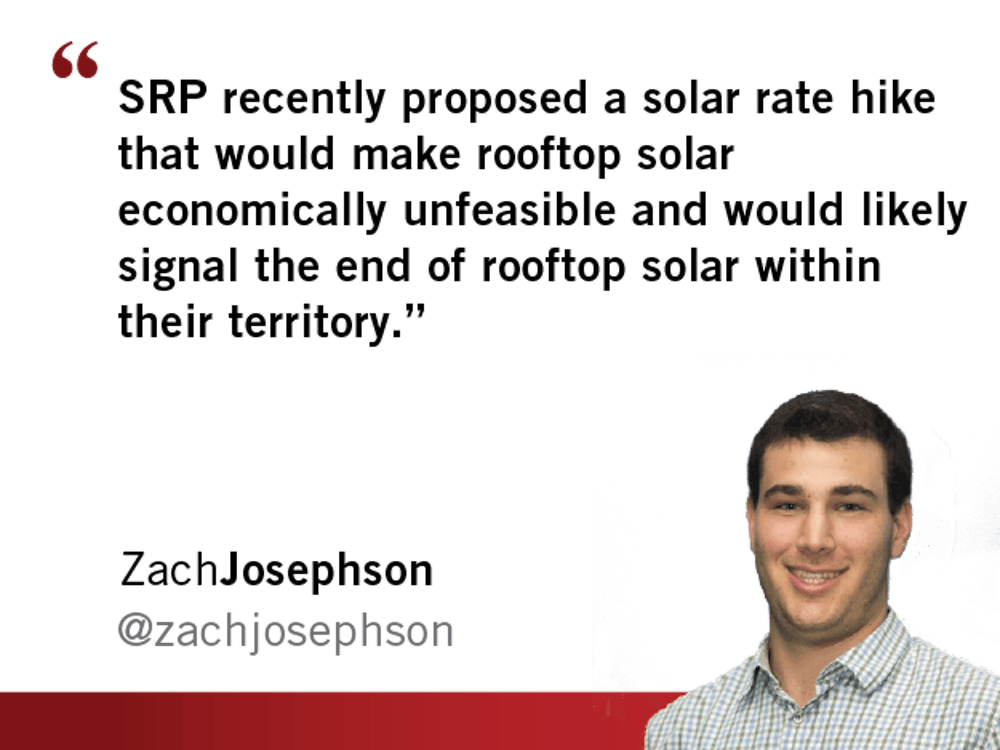Arizona is a state that is blessed with the opportunity to aggressively pursue solar electricity generation. However, the electricity companies in the state have recently become aggressively anti-solar; at least solar that they can’t control.
In 2013, Arizona Public Service Company proposed a fee increase from $50 to $100 per month on all of their customers who had rooftop solar installations. With a total price tag of at least $600 per year, APS’s customers were outraged and the Arizona Corporation Commission eventually settled on a roughly $5 per month fee increase that would only apply to new solar installations.
For APS, the increased solar fee has only been moderately successful. Following the fee increase in January 2014, the number of people installing solar dropped dramatically. According to an article published by The Arizona Republic, “APS saw 280 people in its territory add rooftop solar panels in January (2014), less than half of the 583 customers who installed solar last January.”
In the short term, the utility benefits from a decrease in rooftop solar production, as people will be buying more of their electricity from the grid. However, APS is required “to comply with the state requirement that 15 percent of its electricity comes from renewable sources by 2025.” Additionally, “30 percent of that renewable power must come from rooftop solar or other 'distributed power' sources.” While APS needs to have some amount of rooftop solar generation, its goal is to limit rooftop solar as much as possible — to keep their revenue as high as possible.
It is obviously understandable that a company such as APS’s first concern is their bottom-line. In a state such as Arizona, where there is so much potential for solar generation, there must be a better way to utilize the resources in the state. According to a report published by The U.S. Energy Information Administration, in 2013, Arizona produced “2,041 Thousand Megawatthours” using solar generation methods, which totals roughly 1.85 percent of all of the electricity generated in the state.
At this point, distributed rooftop solar doesn’t pose a threat to the business model established by APS or the Salt River Project. Despite the non-existent threat, SRP, another of Arizona’s largest electricity companies, has proposed a rate hike for all of its customers with rooftop solar. In contrast to APS’s recently imposed fee, SRP’s fee would range from $50 to $100 per month and would apply to all customers, not just future installations. Additionally, as opposed to APS, the Corporation Commission doesn’t have the ability to regulate SRP’s pricing model.
Given what has already been seen in the months following the implementation of APS’s slight fee increase, such a dramatic price increase would in all likelihood crush existing solar usage and prevent any serious expansion of rooftop solar generation. Unfortunately, solar would no longer make economic sense, and the only people who would consider rooftop solar would be those who are environmentally conscious enough to ignore the financial implications of the installation.
With the rapid drop in rooftop solar installations, the solar industry in Arizona will grind to a halt. According to a story published by The Arizona Republic, “By 2012, Arizona had about 9,800 people working in the solar industry, the most per capita in the U.S.” With the decrease in solar installations, Arizona’s economy will suffer as the entire industry contracts and has to cut their workforce.
The only way to save the solar industry in Arizona is to tell SRP that the customers won’t accept such a dramatic rate increase. Without a revision to this fee increase, the solar industry will come to an unceremonious end in Arizona.
In a state with such high solar potential, it is unacceptable for the electric companies to unilaterally signal the end of the rooftop solar industry in the state. SRP needs to listen to its customers and alter their price hike to allow the rooftop solar industry to continue to grow, without threatening their business model.
Reach the columnist at zjosephs@asu.edu or follow @zachjosephson on Twitter.
Editor’s note: The opinions presented in this column are the author’s and do not imply any endorsement from The State Press or its editors.
Want to join the conversation? Send an email to opiniondesk.statepress@gmail.com. Keep letters under 300 words and be sure to include your university affiliation. Anonymity will not be granted.
LikeThe State Presson Facebook and follow@statepresson Twitter.





